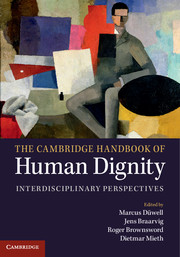Book contents
- Frontmatter
- Contents
- List of contributors
- Foreword
- Why a handbook on human dignity?
- Acknowledgments
- 1 Human dignity from a legal perspective
- 2 Human dignity: concepts, discussions, philosophical perspectives
- Part I Origins of the concept in European history
- Part II Beyond the scope of the European tradition
- 13 The concepts of human dignity in moral philosophies of indigenous peoples of the Americas
- 14 Human dignity in the Islamic world
- 15 Hinduism: the universal self in a class society
- 16 Buddhism: inner dignity and absolute altruism
- 17 Human dignity in traditional Chinese Confucianism
- 18 Dignity in traditional Chinese Daoism
- Part III Systematic conceptualization
- Part IV Legal implementation
- Part V Conflicts and violence
- Part VI Contexts of justice
- Part VII Biology and bioethics
- Appendix 1 Further reading
- Appendix 2 Universal Declaration of Human Rights
- Index
- References
15 - Hinduism: the universal self in a class society
from Part II - Beyond the scope of the European tradition
Published online by Cambridge University Press: 05 March 2015
- Frontmatter
- Contents
- List of contributors
- Foreword
- Why a handbook on human dignity?
- Acknowledgments
- 1 Human dignity from a legal perspective
- 2 Human dignity: concepts, discussions, philosophical perspectives
- Part I Origins of the concept in European history
- Part II Beyond the scope of the European tradition
- 13 The concepts of human dignity in moral philosophies of indigenous peoples of the Americas
- 14 Human dignity in the Islamic world
- 15 Hinduism: the universal self in a class society
- 16 Buddhism: inner dignity and absolute altruism
- 17 Human dignity in traditional Chinese Confucianism
- 18 Dignity in traditional Chinese Daoism
- Part III Systematic conceptualization
- Part IV Legal implementation
- Part V Conflicts and violence
- Part VI Contexts of justice
- Part VII Biology and bioethics
- Appendix 1 Further reading
- Appendix 2 Universal Declaration of Human Rights
- Index
- References
Summary
Human dignity in the Indian tradition is an immense topic; in this chapter, I will discuss some aspects of human dignity in the Hindu tradition. As a rough definition, I take Hinduism to refer to those traditions that accept the Vedic heritage (śruti, ‘heard from the gods’) as the source of truth.
I will employ three main sources for our inquiry into human dignity in the Hindu tradition: the Upaniṣads, the Laws of Manu and the Bhagavadgītā. I will discuss each of these in turn, and suggest that human dignity in Hinduism is an ambiguous and perhaps even paradoxical concept: on the one hand, all living beings (not solely human beings) are thought to possess inherent dignity, but on the other hand we find that in the social realm dignity appears in degrees.
The Upanisads
The Upanisads are dialogues in Sanskrit which were handed down orally as part of the Veda, articulating the essentials of Vedic wisdom. These dialogues, stemming from approximately the sixth century BC, contain two central doctrines: the teachings of atman and brahman – explaining the identity of Self and UniversalWhole – and the doctrine of reincarnation or metempsychosis.
- Type
- Chapter
- Information
- The Cambridge Handbook of Human DignityInterdisciplinary Perspectives, pp. 163 - 169Publisher: Cambridge University PressPrint publication year: 2014
References
- 5
- Cited by



